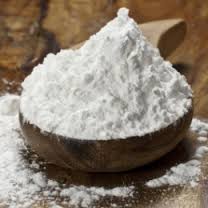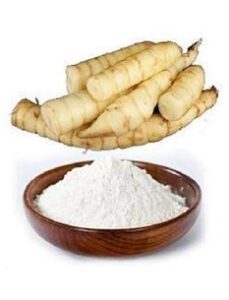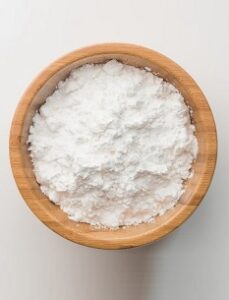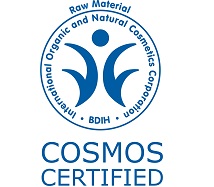

Organic Arrowroot
Organic arrowroot, scientifically known as Maranta arundinacea, is native to the tropical regions of South America, particularly in countries like Brazil, Colombia, and Venezuela. It has been cultivated for centuries by indigenous peoples in these regions for its culinary and medicinal properties.
Arrowroot plants thrive in warm, humid climates with well-drained soil. They are typically grown in tropical rainforests or subtropical areas where they receive ample sunlight and consistent moisture. The plant itself is a perennial herbaceous species with large, arrow-shaped leaves and underground rhizomes that store starch, which is the valuable part used in culinary applications.
Arrowroot powder is thickening power of wheat flour and is gluten free. Unlike corn starch, arrowroot starch creates a perfectly clear gel and does not break down when combined with acidic ingredients.
Arrowroot is in general employed to obtain starch and may yield about 12-15% of starch by dry weight. Arrowroot powder is fine, clear white, and odourless item, found use as a thickening agent in the food industries. Gluten-free starch is used in special food preparations for celiac disease patients. Arrowroot contains healthy levels of the B-complex group of vitamins such as niacin, thiamine, pyridoxine, pantothenic acid, and riboflavin. Organic Arrowroot Powder is excellent for thickening fruit gels and fruit sauces, like cranberry sauce, or acidic sauces like sweet and sour sauce.
Today, organic arrowroot is cultivated in various parts of the world, including Southeast Asia, the Caribbean, and parts of Africa, where suitable growing conditions are available. Organic farming practices ensure that the cultivation of arrowroot is done without the use of synthetic pesticides, herbicides, or genetically modified organisms (GMOs), promoting sustainability and environmental stewardship.
 |
 |
 |
Features of organic arrowroot powder
1. Natural Thickening Agent: Arrowroot powder is well-known for its excellent thickening properties. When mixed with liquid, it forms a smooth, clear gel, making it ideal for thickening sauces, soups, gravies, and puddings. It can be used as a healthier alternative to corn starch or wheat flour in recipes.
2. Gluten-Free: Organic arrowroot powder is naturally gluten-free, making it suitable for individuals with gluten sensitivities or those following a gluten-free diet. It provides a safe alternative for thickening sauces and baking without compromising on texture or taste.
3. Neutral Flavour and Colour: Arrowroot powder has a neutral taste and odour, which makes it versatile for use in various recipes without altering the flavour profile of the dish. It also maintains a white colour when cooked, making it suitable for dishes where colour retention is important.
4. Gentle on the Digestive System: Unlike some other thickeners, arrowroot powder is easily digestible, making it gentle on the stomach. It’s often recommended for individuals with digestive issues or sensitive stomachs.
5. Nutrient-Rich: Arrowroot powder contains various nutrients, including potassium, iron, and B vitamins. While it’s primarily used as a thickening agent, it can also contribute to the nutritional value of dishes.
6. Versatile Uses: In addition to culinary applications, organic arrowroot powder has various other uses. It’s commonly used in natural cosmetics and personal care products as a thickening agent, absorbent, or soothing ingredient in body powders, dry shampoo, and skincare formulations.
7. Organic Certification: Organic arrowroot powder is sourced from plants grown using organic farming practices, free from synthetic pesticides, herbicides, and GMOs. This ensures a high-quality product that aligns with organic standards and supports sustainable agriculture.
8. Long Shelf Life: When stored properly in a cool, dry place, organic arrowroot powder has a long shelf life, allowing it to be used over an extended period without losing its thickening properties or nutritional benefits.
Benefits of Organic Arrowroot Powder
1. Digestive Health: Arrowroot powder contains high levels of dietary fiber, which aids in digestion, prevents constipation, and promotes a healthy digestive system.
2. Gluten-Free Alternative: It is a great substitute for wheat flour or other gluten-containing thickeners, making it suitable for individuals with gluten intolerance or celiac disease.
3. Blood Sugar Regulation: The low glycemic index of arrowroot powder helps regulate blood sugar levels, making it a favorable choice for individuals with diabetes or those looking to maintain stable blood sugar levels.
4. Nutrient Absorption: Arrowroot powder helps enhance nutrient absorption in the body by optimizing the absorption of vitamins and minerals from the food we consume.
5. Allergen-Free: It is hypoallergenic and doesn’t contain common allergens like nuts, dairy, or soy, making it safe for individuals with food allergies or sensitivities.
6. Soothes Digestive Disorders: Due to its gentle nature, arrowroot powder is often used to alleviate symptoms of digestive disorders like diarrhea, irritable bowel syndrome (IBS), and other gastrointestinal discomforts.
7. Weight Management: With its low-calorie content and high fiber content, arrowroot powder can aid in weight management by promoting a feeling of fullness and supporting healthy digestion.
8. Natural Thickening Agent: Arrowroot powder has excellent thickening properties. When mixed with liquid, it forms a smooth, clear gel, making it ideal for thickening sauces, soups, gravies, and puddings.
9. Nutrient-Rich: While primarily used as a thickening agent, arrowroot powder contains various nutrients, including potassium, iron, and B vitamins, which can contribute to the nutritional value of dishes.
Usage of Arrowroot Powder
Organic arrowroot powder, being a versatile and natural ingredient, finds applications across several industries. Here’s how it can be used in different sectors:
1. Food Industry:
-
-
- Bakery and Confectionery: Organic arrowroot starch can be used as a gluten-free alternative to wheat flour in baking recipes. It adds lightness and texture to baked goods.
- Sauces and Soups: As a thickening agent, organic arrowroot powder can be used in the production of organic sauces, soups, and gravies.
- Organic Snacks: It can be incorporated into organic snack foods like crackers, chips, and energy bars to improve texture and consistency.
-
2. Personal Care Products:
-
-
- Natural Cosmetics: Organic arrowroot powder is used in natural cosmetics such as face powders, dry shampoos, and body powders as a thickening agent and absorbent.
- Organic Skincare: It can be found in organic skincare products such as lotions, creams, and masks, where it helps to absorb excess oil and provide a silky texture.
-
3. Pharmaceuticals and Nutraceuticals:
-
-
- Organic arrowroot powder can be used as an excipient or filler in the production of organic tablets, capsules, and powders.
- It may also find use in organic dietary supplements and nutraceuticals as a binder or thickening agent.
-
4. Textiles:
-
-
- In the textile industry, organic arrowroot starch can be used in organic fabric sizing and finishing processes to provide stiffness and smoothness to organic textiles.
-
5. Pet Products:
-
-
- Organic arrowroot powder can be used in the production of organic pet foods and treats as a thickening agent, binder, or texturizing agent.
- It may also find use in organic pet grooming products such as dry shampoos or grooming powders.
-
6. Household Products:
-
- Organic arrowroot powder can be incorporated into organic household products such as organic carpet deodorizers or organic drawer fresheners to absorb odours and moisture.
Precautions while using Organic arrowroot powder
1. Allergy Alert: Be cautious if you have known allergies to other root vegetables, as there is a possibility of cross-reactivity with arrowroot. Perform a patch test before applying arrowroot powder topically or consuming it if you have any concerns about allergies.
2. Moderation: While arrowroot powder is generally safe for consumption, excessive intake may lead to digestive discomfort such as bloating or diarrhoea. Use it in moderation and follow recommended serving sizes in recipes.
3. Hygiene: Ensure that your hands and utensils are clean before handling arrowroot powder to prevent contamination. Store it in a dry, airtight container away from moisture and direct sunlight to maintain its quality.
4. Avoid Inhalation: When working with arrowroot powder, take care to avoid inhaling the fine particles, as this may irritate the respiratory tract, particularly for individuals with respiratory conditions like asthma.
5. Mixing Instructions: When using arrowroot powder as a thickening agent, mix it with a small amount of cold liquid to form a slurry before adding it to hot liquids. This helps prevent clumping and ensures even distribution.
6. Heat Sensitivity: Arrowroot powder loses its thickening properties if exposed to prolonged heat, so avoid boiling or overheating dishes thickened with arrowroot.
7. Storage: Store organic arrowroot powder in a cool, dry place away from heat and moisture. Check the expiration date and discard any powder that has exceeded its shelf life.
Search Products
- Organic Botanical Extract
- Organic Cereals
- Organic Edible Oils
- Organic Emulsifiers
- Organic Essentials Oils & Extracts
- Organic Fatty Acids
- Organic Flours
- Organic Formulations
- Organic Herbs
- Organic Minerals
- Organic Nutraceuticals
- Organic Nuts
- Organic Oil Seeds
- Organic Pulses
- Organic Special Products
- Organic Spices
- Organic Starch
- Organic Vitamins










